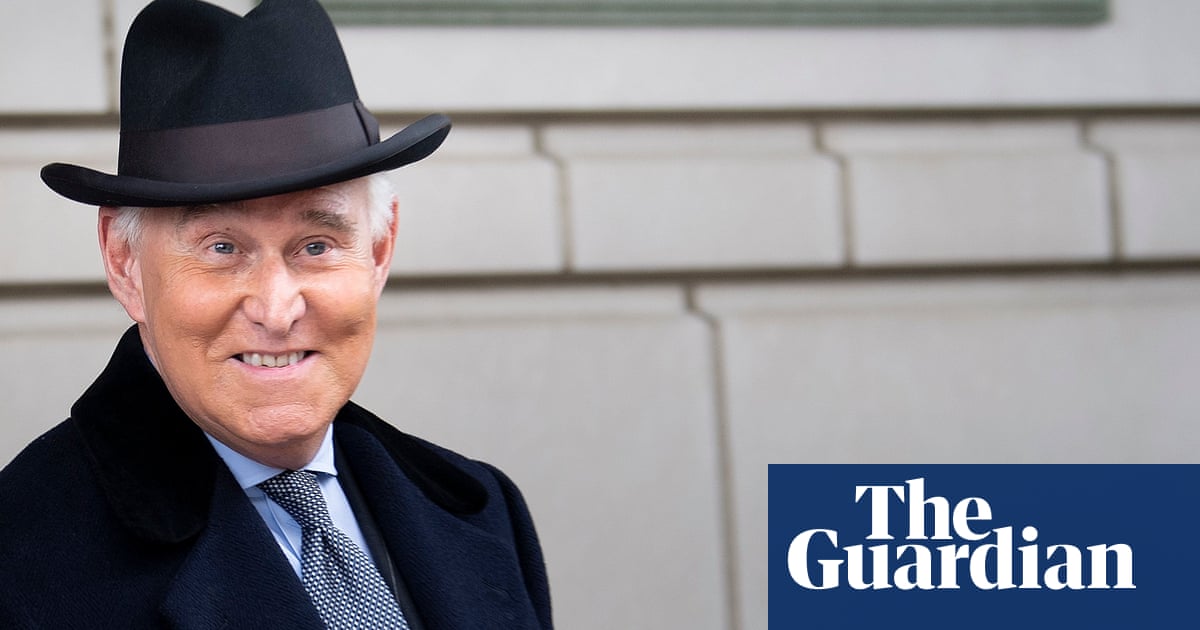
A federal prosecutor who was part of Robert Mueller’s Russia investigation told Congress on Wednesday Roger Stone, a close ally of Donald Trump, was given special treatment before sentencing because of his relationship with the US president.
“What I heard repeatedly was that Stone was being treated differently from any other defendant because of his relationship to the president,” Aaron Zelinsky told a House judiciary committee hearing into the politicisation of Department of Justice (DoJ) under Attorney General William Barr.
Stone was convicted on all seven counts of an indictment that accused him of lying to Congress, tampering with a witness and obstructing the House investigation into whether the Trump campaign coordinated with Russia to tip the 2016 election.
Zelinsky’s team recommended a sentence as long as nine years. But Barr intervened and Stone is now scheduled to report to prison on 30 June to serve a 40-month sentence, plus two years probation and a $20,000 fine.
The 67-year-old’s lawyers are seeking a delay, citing concerns over coronavirus outbreaks in detention centers. Trump has strongly hinted he will pardon Stone.
Wednesday’s hearing was part of attempts by Democrats to hold Barr to account for what they see as the politicisation of the DoJ.
Zelinsky testified shortly after a federal appeals court said a judge could not scrutinize a DoJ decision to drop its case against Michael Flynn, another close Trump aide.
Flynn, Trump’s first national security adviser, was fired for lying about contacts with the Russian ambassador. As part of the Mueller investigation into the 2016 election and Russian influence, he pleaded guilty to lying to the FBI. Before the DoJ reversed itself and sought to drop the case, it had recommended a six-month sentence.
The development in the Flynn case was referred to frequently in the hearing, which at the outset was subject to noisy procedural objections from Republican members.
During questioning, Republicans sought to ridicule the premise of the hearing, insisting Barr was restoring DoJ independence after alleged abuses under Barack Obama and his vice-president, Joe Biden – now Trump’s opponent for the presidency in November’s election – including in the case of Flynn.
Appearing as witnesses in the room on Capitol Hill were Donald Ayer, a deputy attorney general under George HW Bush; John Elias, a DoJ whistleblower testifying about antitrust matters under Barr; and Michael Mukasey, formerly attorney general under George W Bush.
Ayer said Barr’s politicization of the DoJ was “worse than Watergate”, the scandal which brought down president Richard Nixon and led to extensive reform. He was roundly attacked by California Republican Louis Gohmert, a leader of the procedural disruptions, including for being a “Democrat witness”. California Democrat Zoe Lofgren, who was a House judiciary committee staffer during Watergate, agreed with Ayers’s statement.
Elias spoke to antitrust concerns around Barr’s approach to the marijuana industry and California’s attempt to deal with automakers over clean air concerns. He was attacked by Georgia representative Doug Collins over his political beliefs and alleged attempts to obtain staff jobs on House committees investigating Trump.
Mukasey spoke in support of Barr.
Committee Democrats launched their investigation of the Stone case earlier this year but have expanded their focus to incidents including efforts to dismiss the case against Flynn and the firing of the top prosecutor in New York’s southern district, who had been investigating Rudy Giuliani, the president’s personal attorney.
Committee chairman Jerry Nadler had threatened to subpoena Barr but as the hearing began, a DoJ spokeswoman tweeted that the attorney general would accept the panel’s invitation to testify on 28 July. The attorney general has never testified before the committee, which held him in contempt last year. He had agreed to appear in March, before the pandemic shuttered operations.
Nadler told CNN last weekend Barr deserved to be impeached and removed but any such effort would be a “waste of time”, because Republicans who hold the Senate would block it.
Zelinsky was one of four lawyers who quit the Stone case after the DoJ overruled them on sentencing. In testimony, he said the acting US attorney at the time, Timothy Shea, received heavy pressure from the highest levels to give Stone a break. He also said Shea was afraid of the president.
Zelinsky did not say who was doing the pressuring, but said there was significant pressure to obscure “the correct sentencing guidelines and water down and in some cases outright distort” what happened at trial and the events that resulted in Stone’s conviction.
Asked to recap what it was Stone had done, Zelinsky said: “He lied about a number of things. What he was doing in September of 2016 related to WikiLeaks, and what he was telling the Trump campaign about it. He lied about providing information to Trump’s campaign.” Zelinsky also detailed Stone’s threats to a witness, which included telling the witness to “prepare to die”.
DoJ leadership changed the sentencing recommendation for Stone hours after Trump tweeted his displeasure, saying it was too harsh. Barr has said he ordered the new filing hours before the tweet because he was caught off guard by the sentencing recommendation and believed it was excessive based on the facts of the case.
At Wednesday’s hearing, Republicans attacked and sought to discredit Elias, Ayer and Zelinsky. The DoJ prosecutor attracted fierce questioning about why he was testifying from his attorney’s office a short distance away when others were present. His coronavirus-related concerns, he said, related to having a newborn child.
In answer to a question from Texas Democrat Sheila Jackson Lee, Ayer said of Barr: “The drumbeat of his misbehavior is accelerating as we approach the election.”
Source: US Politics - theguardian.com



